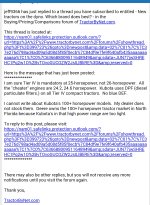WORKING DRAFT (7.3)
The fundamental importance of TRACTOR WEIGHT eludes many tractor shoppers. Heavier tractor chassis weight is more important for most tractor operations than increased tractor horsepower. Bare tractor weight is a tractor specification easily found in sales brochures and web sites, readily comparable across tractor brands and tractor models, new and used. The most efficient way to shop for tractors is to list tractor applications first, then determine bare tractor weight needed to safely accomplish your tasks.
Within subcompact and compact tractor categories, bare tractor weight must increase 50% before you notice a significant tractor capability increase. It takes a 100% increase in bare tractor weight to elicit MY-OH-MY!
Shop your weight range within tractor brands. Budget will eliminate some choices. Collect a dealer brochure for each tractor model in your weight range. I spreadsheet tractor and implement specs, often a revealing exercise. I have a column for cost per pound.
Most tractors under 3,000 pounds bare weight operate in residential or hobby farm applications on one to ten flat acres. Subcompact and compact tractors under 3,000 pounds will enter a residential garage with typical 84" door height.
Selling a used tractor is easy. Selling multiple light implements in order to buy heavier, wider implements for a heavier tractor requires a lot of time. Depreciation on implements is generally greater than depreciation on a tractor.
Tractors over 3,000 pounds bare weight are generally offered in a utilitarian configuration and a deluxe configuration. Deluxe kit enhances productivity and operating comfort ~~~ but you must pay. Most tractors over 3,000 pounds bare weight are too tall to fit through an 84" height garage door, even with ROPS folded.
Heavier tractors are built on larger frames with larger wheels/tires. A heavier tractor with large diameter tires has more tractive power pulling ground contact implements, pushing a loader bucket into dirt and pushing snow. Large wheels and tires increase ground clearance, enabling a heavier tractor to bridge holes, ruts and downed tree limbs with less bucking and disturbance operating over rough pasture and woodland.
Safe hillside operation demands more tractor weight than level land operation. Heavier tractors have adjustable rear wheel spreads; wide rear wheel spreads hugely improve tractor stability. Four wheel drive is essential on hillsides. Four wheel drive supplies increased traction. When descending slopes 4-WD augments rear brakes as tractor weight shifts forward, decreasing rear tire grip.
Tractors optimized for hill work have liquid installed in the rear tires rather than air. "Loaded" tires are filled 50% to 75% with liquid, which lowers the tractor's center-of-gravity, increasing rollover resistance. "Loading" two compact tractor rear tires will increase tractor weight 300 pounds to 800 pounds over weight of identical two tires inflated with air.
A quality dealer, reasonably close, available for coaching, is important for tractor neophytes. Almost every new tractor is delivered with a glitch or two requiring correction. My kubota dealer is six miles away. I feel my local dealer continues to add value to my equipment. Dealer proximity is less important to those experienced with tractors and qualified to perform their own maintenance.
BUY ENOUGH TRACTOR.

